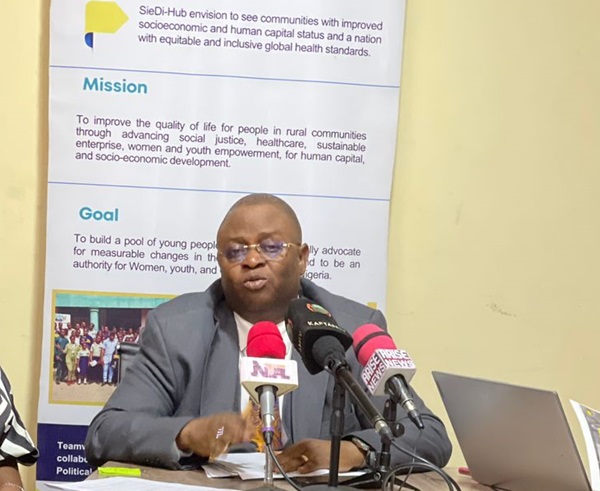
SieDi-Hub, a women-led, youth-driven nonprofit focused on gender justice, health equity and civic inclusion, has unveiled an ambitious roadmap to scale its grassroots-led and data-driven interventions across Nigeria’s six geopolitical zones.
The announcement came during a Mid-Term Impact Report media briefing and strategic board meeting held Saturday in Abuja. The dual-purpose event marked a pivotal point in the organisation’s five-year strategic plan (2022–2027), offering an opportunity to assess progress, refine strategies, and galvanize support for the next phase of its work.
Bringing together development partners, government stakeholders, board members, the media and community leaders, the event reflected SieDi-Hub’s inclusive ethos and participatory approach to change-making. Since its founding in 2022, the organisation has positioned itself as a bold force for social transformation, driven by a commitment to evidence-based programming and collective action.
“This milestone is both a celebration and a recommitment,” said the executive director of SieDi-Hub, Chinasa Imo. “We have faced challenges, but we’ve remained anchored in our vision—to walk with communities, amplify underrepresented voices and reimagine what is possible.”
Highlighting key accomplishments from the first half of its strategic cycle, Imo noted that SieDi-Hub has trained over 1,000 students in digital safety through its Safe Space Clubs initiative, launched across secondary schools in underserved areas. In addition, the NwanyịBụIhe Community Leadership Network has empowered more than 150 women with tools to prevent gender-based violence and access micro-credit to support their financial independence.
Further, the Community Health Youth Champions (CHYC) programme has trained 25 youth health advocates and successfully influenced primary healthcare policies through state-level multi-stakeholder dialogues.
Imo also reported that SieDi-Hub has published six policy briefs tackling systemic issues such as poverty, gender-based violence (GBV), and youth marginalisation. Meanwhile, its Vision Clinic Campaign provided free eye-care services to 353 rural residents across Abia State – another example of the hub’s hyper-local yet scalable model.
“Our work is not just about numbers,” she said. “Whether it’s a girl learning how to stay safe online or a survivor finding the courage to seek justice, each story represents progress toward a more inclusive and just society.”
Programme manager at SieDi-Hub, Paul Okpara emphasised the intentionality behind these interventions. “Our programmes are rooted in baseline research and real community needs. We aim to improve quality of life through expanded access to social justice, health, enterprise and empowerment for women and youth,” he said.
Okpara highlighted that the hub’s strategy aligns strongly with global goals – particularly SDGs 3 (Good Health and Well-being), 5 (Gender Equality) and 16 (Peace, Justice and Strong Institutions). He also shared that SieDi-Hub has trained more than 500 women small business owners in digital skills, supported out-of-school youth with vocational tools and distributed menstrual hygiene kits and scholarships to hundreds of girls.
“These outcomes speak to a long-term commitment to community transformation, not charity,” he said.
Chair of SieDi-Hub’s governing board and former director of health emergency preparedness at the Nigeria Centre for Disease Control (NCDC), Dr. John Oladejo said the mid-term report demonstrates more than outputs.
“This is about lives improved, voices amplified and systems strengthened through inclusive, data-informed programming. The next two years are critical. We must ensure no one is left behind – especially our youth and women.”
Board vice-president and renowned women’s rights advocate, Esther Agbon urged the nonprofit to continue investing in young people. “What SieDi-Hub is doing to shape the minds of adolescents through digital literacy and civic education is powerful. We must invest in youth, not only as future leaders, but as leaders now,” she said.
Agbon also pointed out the need for diversified funding. “External donors are important, but we must also look inward. Local philanthropies and community champions must be mobilised to sustain this movement.”
Comfort Runyi, a newly appointed board member and organisational positioning advisor, described the Mid-Term Report as “proof of competence and credibility.”
“What SieDi-Hub has accomplished with limited resources is remarkable. Now is the time to scale; not just within Abia State, but across Nigeria’s six regions,” she said. Runyi outlined plans to begin with two states per geopolitical zone and disseminate the model through targeted outreach to policymakers, partners, and sector stakeholders.
“With over three decades of collective experience on this board, we’re confident in SieDi-Hub’s ability to lead inclusive, gender-responsive, and impact-driven programmes at scale,” she added.
But the road ahead is not without challenges.
Co-founder of SieDi-Hub, Grace Ude highlighted critical legal and financial gaps that continue to hinder gender justice in many states. “Too many survivors still ask, ‘What happens if I speak up?’ because in most states, the Violence Against Persons (Prohibition) Act has not been domesticated,” she said.
With only skeletal NAPTIP liaison offices and limited survivor support systems in place, Ude called on state assemblies to accelerate legislative domestication efforts. She also appealed to donors to support grassroots advocacy teams working to close these legal gaps.
Despite funding constraints, SieDi-Hub has made notable progress. Through support from the Nigerian Women’s Trust Fund, the hub launched an interest-free microcredit scheme for GBV survivors, starting with five and now supporting ten women entrepreneurs.
“To expand this life-changing initiative beyond Abia we need government partnership and fresh investment,” Ude said.
Looking ahead to 2025–2027, SieDi-Hub plans to expand its Safe Space digital literacy programme to 30 schools, scale menstrual health interventions, launch a structured youth entrepreneurship initiative, and build a centralised health-data repository to support government decision-making.
The hub’s unique model, which blends grassroots engagement, evidence-based advocacy, and youth-led development, continues to earn support from influential partners such as the Ford Foundation, Spaces for Change, Microsoft, the Abia State Government and other community-based organisations.
As the strategic roadmap unfolds, SieDi-Hub’s mission remains clear: to ensure inclusive governance, healthier communities, and equitable opportunities for women, youth and marginalised populations—one community at a time.

